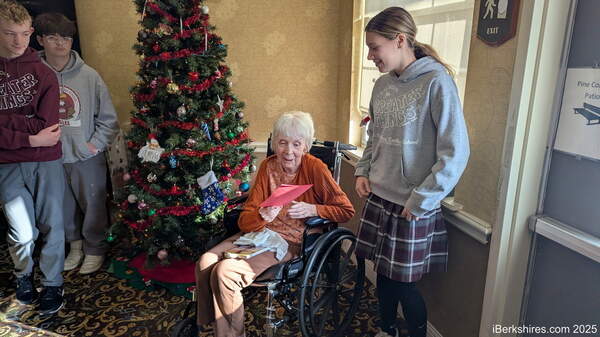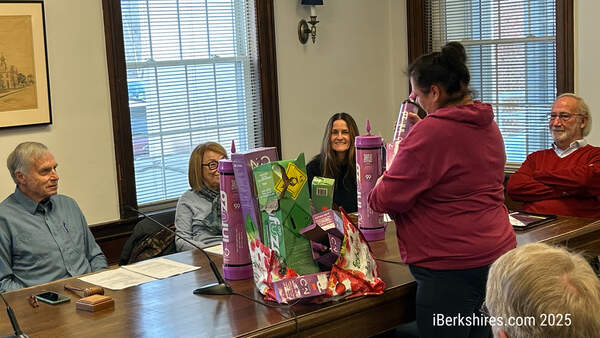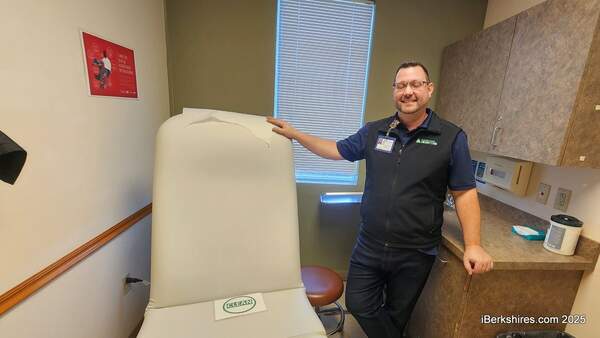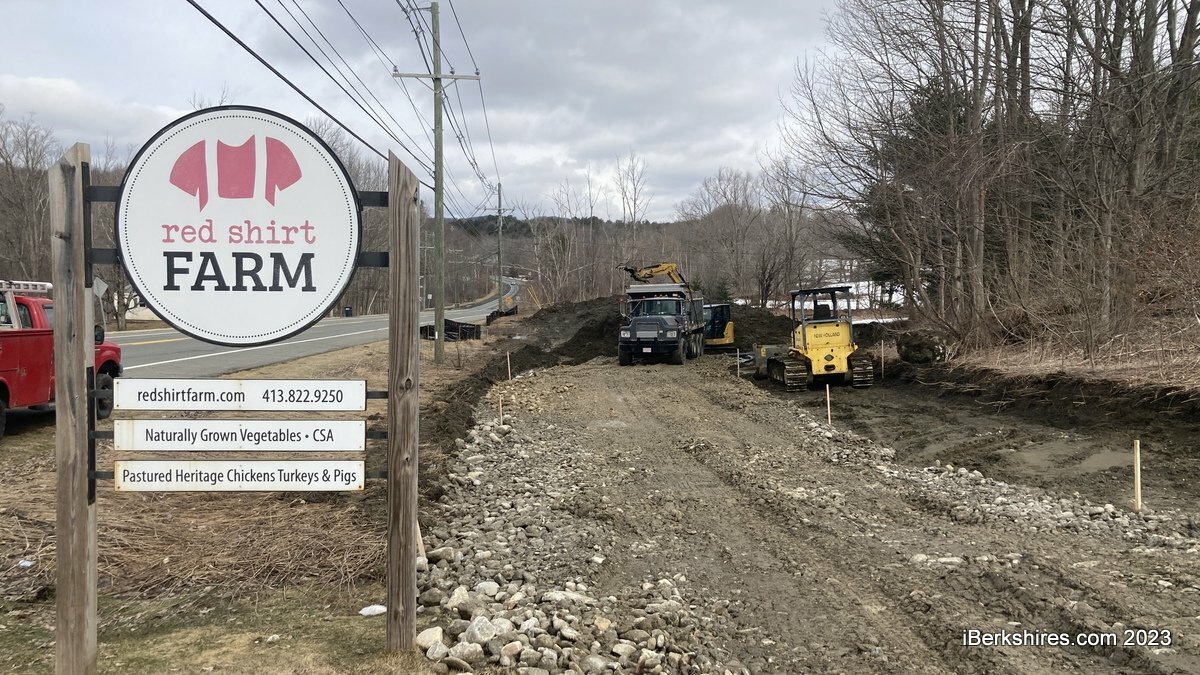
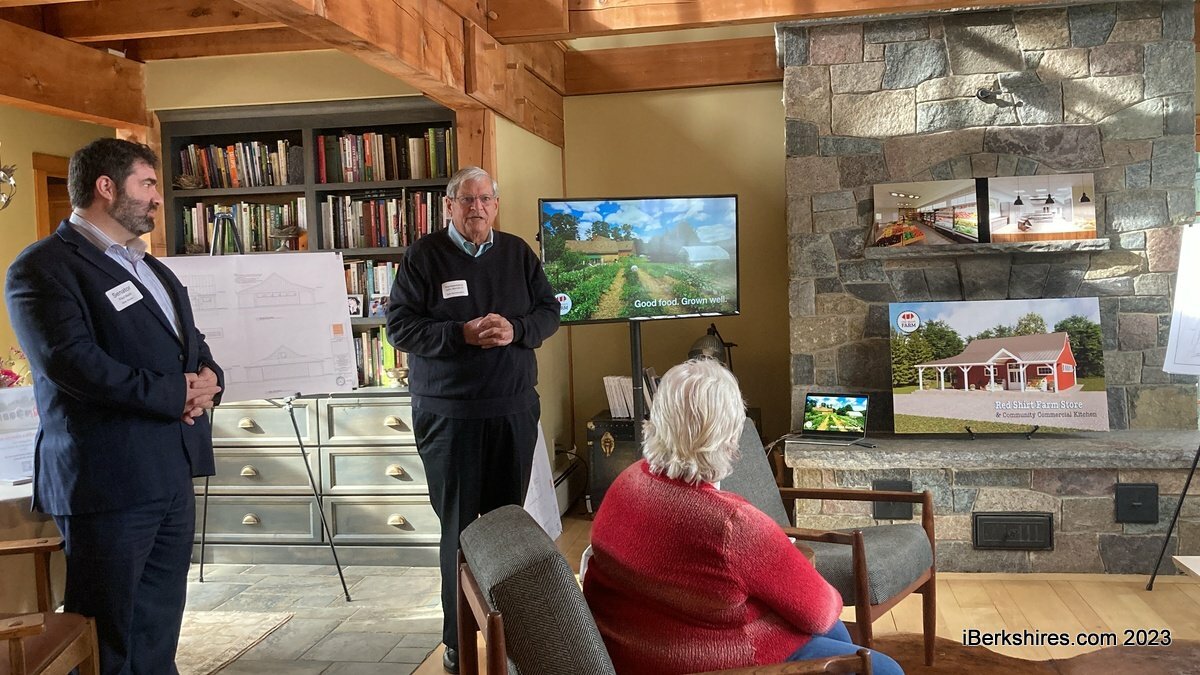
Red Shirt Farm Expanding With Store/Commercial Kitchen Build

LANESBOROUGH, Mass. — Red Shirt Farm will debut a farm store and community commercial kitchen on Route 7 to offer local food choices and opportunities for learning.
The farm recently broke ground on the project and plans to have a soft opening in December.
On Friday, state and local officials gathered at the 10-acre farm for a site visit organized by 1Berkshire.
Owner Jim Schultz detailed Red Shirt's organic, regenerative farming practices, low carbon footprint operations, and dedication to food access that led to building a store.
"Our mission is very much values-driven," he explained. "It's about growing good food, growing it well, and distributing it to our neighbors and our community."
This resonates with state Sen. Paul Mark and state Rep. John Barrett III, who are passionate about rural advocacy.
"This is what I believe is going to be a driver of agriculture not only in Berkshire County but also in Western Mass," Barrett said. "This is the wave of the future. This is what it's all about."
Mark said that when thinking about the area's agricultural successes, it is important not to compete with the industrial farms of the Midwest and western parts of the United States.
"We don't have the same land resources, we don't want to cut corners, we don't want to mass produce. What we want to do is we want to diversify. We want to specialize," he explained.
"We want to give people a reason that you're going to eat something that you know is local, it's grown, you know how it was grown, you know how the animals were raised, you know they were taken care of. It's your neighbors, it's your friends. It supports our local economy. It supports our local culture. It supports who we are as residents of Western Massachusetts and of the Berkshires."
As the chair of the Senate Committee on Tourism, Arts, and Cultural Development, he thinks this will be another reason for people to visit the county and spend money.
About a year and a half ago, Schultz joined Entrepreneurship for All (EforAll) for its one-year program that helps small businesses get off the ground.
It is common for people to pull into the farm looking for a store to purchase its offerings, so he spent that time thinking about how a commercial kitchen and learning space could be integrated into the design.
A survey with 100 local respondents showed that people want to buy local and they are willing to drive 15 to 30 minutes to get those products.
The 30-by-40-foot building will feature a retail space offering produce, meat, eggs, and dairy from Red Shirt and other local farmers as well as dry and value-added goods.
The total cost will be around $774,000: about $675,000 for construction and about $99,000 for equipment. To date, nearly $370,000 has been raised in grants from the Farm Viability Enhancement Program, an FY22 Food Security Infrastructure Grant, a Healthy Food Financing Initiative Grant, and an Agricultural Food Safety Improvement Grant.
On Friday, a crowdfunding campaign supported by the Massachusetts Growth Capital Corp. was launched with the goal of raising $60,000. By the late afternoon, it garnered about $8,000.
Around $13,500 in personal funds have been allocated and the farm is seeking an FY24 Food Security Infrastructure Grant for about $344,000 to pay for additional construction costs.
The shop will be located on a central corridor that sees more than 5,000 to 7,000 cars a day.
"What we want is to take these farms that have their little farm stands off the beaten path and give them a place where they can get visibility for what they do," Schultz said.
The kitchen will allow the farm to preserve, process, and add value to its products, open the space to other farmers, and host workshops.
Two full-time and two part-time positions will be created with the build.
Construction has not yet started but is expected to be substantially done over the summer.
People currently access the farm's products through the Community Supported Agriculture program and at farmer's markets in North Adams and Pittsfield.
Red Shirt Farm aims to inspire health and awareness by nourishing the community, stewarding its land, and restoring heritage breeds.
"Traditionally, agriculture is about killing things. It's about herbicides and pesticides and fungicides, about tillage, about changing it to be how we want it to be but it does not necessarily grow good food," Schultz said.
"We're about creating health and our soil, pretty health, mineral land, keeping our animals healthy because all of that produces food that makes all of us healthy."
Education, climate resiliency, and food access are important values to the farm.
The farm offers an 8-month apprenticeship program for four young people each season, works with Roots Rising, and is involved in grant-funded research studying the effect of regenerative farming methods.
The farm strives to reduce its carbon footprint as much as possible, using solar panels to provide a majority of its electricity, a climate battery to heat its greenhouses without fossil fuels, and using no-till regenerative growing practices to reduce the amount of carbon dioxide that is released into the atmosphere.
To serve all community members regardless of socio-economic status, it offers free and reduced-cost CSA shares to low-income families and Supplemental Nutrition Assistance Program, or SNAP, CSA shares.
This was the first event of its kind that 1Berkshire has held in three years.
"Food and agriculture is a critical economic cluster here in the Berkshires," Director of Economic Development Benjamin Lamb said. "Not only does it feed the people, but it also feeds our economy directly."
Tags: agriculture,



